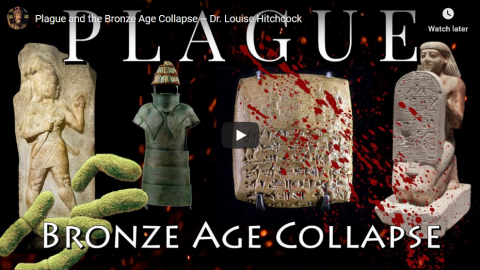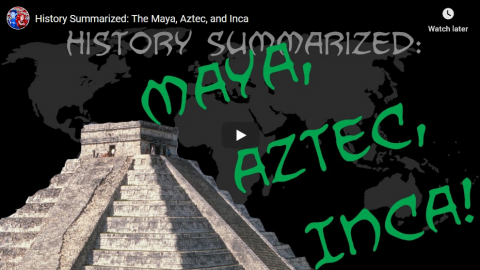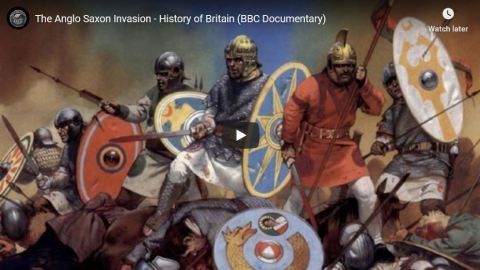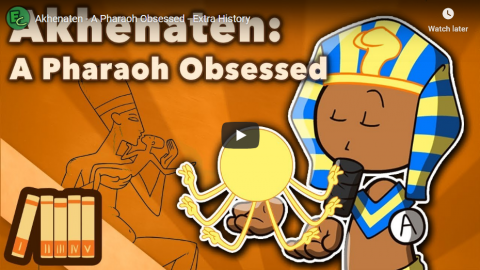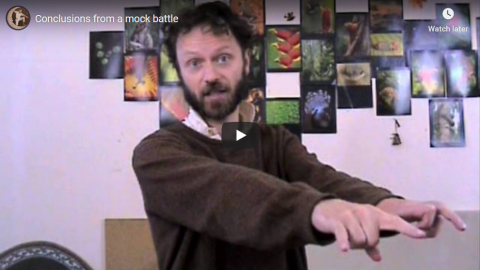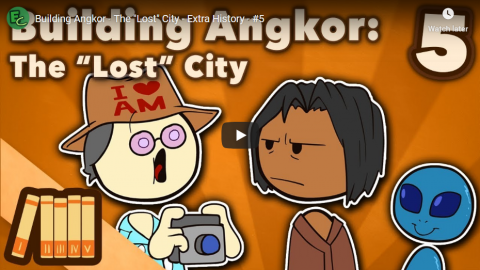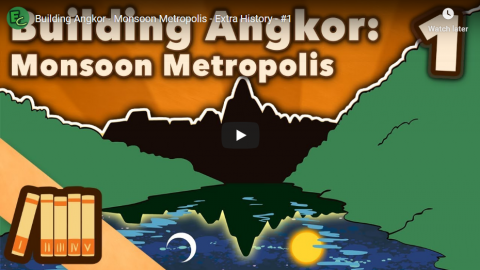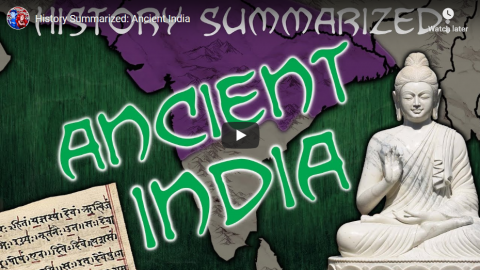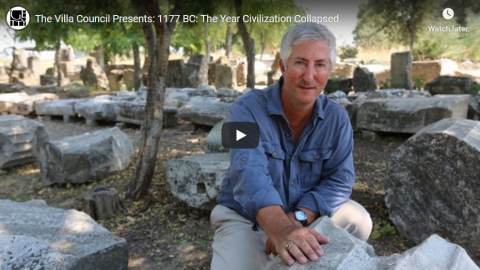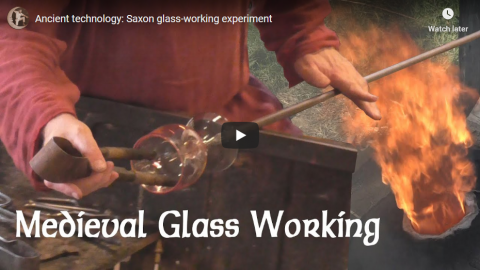The Study of Antiquity and the Middle Ages
Published 16 May 2020Ladies and Gentlemen, welcome to the series NAUE II SWORDS, GERMS, & IRON brought to us by none other than Dr. Louise Hitchcock and this episode is going to be about plague and the Bronze Age collapse. This episode will also be drawing on modern parallels such as “What Covid-19 Can Tell Us About the Bronze Age (12th cent) Collapse?”
It will dive into the Bronze Age and discuss was plague a contributing factor in decline of the Bronze Age and the birth of the Iron Age? How familiar were the ancient peoples with plague and epidemics and what do the ancient literary sources tell us? From discussing plague in ancient Mesopotamia to the Philistine Plague to a Hittite King who falls prey to a deadly disease we explore new thoughts, theories and research involving a period that we all love and a subject that could not be more relevant and that is plague.
Check out the awesome work of Dr. Hitchcock at these links below!
Academia profile where you can access her work that is free to the public. https://unimelb.academia.edu/LouiseHi…
Get her books here!
Aegean Art and Architecture: https://global.oup.com/ukhe/product/a…
Minoan Architecture: A Contextual Analysis: http://www.astromeditions.com/books/b…
Theory for Classics: https://www.routledge.com/Theory-for-…
DAIS: The Aegean Feast https://www.peeters-leuven.be/detail….
Tell It In Gath: Studies in the History and Archaeology of Israel. Essays in Honor of Aren M. Maeir on the Occasion of his Sixtieth Birthday https://www.zaphon.de/epages/83179382…Follow her on Twitter: https://twitter.com/ashlarblocks
To support the channel, become a patron and make history matter!
Patreon: https://www.patreon.com/the_study_of_…
Donate directly to paypal: https://paypal.me/nickbarksdale
Enjoy history merchandise? Check out our affiliate link to spqr emporium! http://spqr-emporium.com?aff=3
*disclaimer, the link above is an affiliate link which means we will earn a generous commission from your magnificent purchase, just another way to help out the channel! join our community!twitter: https://twitter.com/nickbarksdale
instagram: https://www.instagram.com/study_of_an…Image credits: Manna Nader, Gabana Studios Cairo
Hittite 3D City and intro footage credits: 3D reconstruction of Imperial Hittite Karkemish by Giampaolo Luglio, Turco-Italian Archaeological Expedition to Karkemish directed by Nicolò Marchetti (University of Boologna)
KARKEMISH (Carchemish) 1300 BC (3D) – The Southern Capital of the Empire Hittite https://youtu.be/RsTdoY__F4U
Music Attribution: Herknungr – Megaliths | Dark Neolithic Meditive Shamanic Ambient Music https://youtu.be/oc8FQwNjPu0
Footage of Ugarit Credit goes to Ruptly. Video Title : Syria: Ancient city of Ugarit freed from Islamic State control https://youtu.be/XKzbk0PFvg0
June 16, 2020
Plague and the Bronze Age Collapse ~ Dr. Louise Hitchcock
May 4, 2020
History Summarized: The Maya, Aztec, and Inca
Overly Sarcastic Productions
Published 29 Jul 2017Human sacrifice, smallpox, and the Spanish empire … that’s the whole story, right? Haha, eheh, hehe, HA, not even close! The civilizations of Mesoamerica are fascinating in their own right, and very distinct from each other too! Step on in and I’ll learn you a thing or two.
Also no spoilers, but next time, I’m covering the Iroquois Confederation! Ok, maybe that was exactly a spoiler. [Reposted here.]
This video was produced with assistance from the Boston University Undergraduate Research Opportunities Program.
PATREON: www.patreon.com/user?u=4664797
MERCH LINKS:
Shirts – https://overlysarcasticproducts.threa…
All the other stuff – http://www.cafepress.com/OverlySarcas…Find us on Twitter @OSPYouTube!
April 7, 2020
Britain AD: The Invasion That Never Was – The Anglo-Saxon Invasion (BBC Documentary)
Johnny66
Published 21 Jun 2015A well-considered documentary by the noted scholar, Dr Francis Pryor. The names Cerdic, Ceawlin, Cedda and Caedwalla are not exactly Germanic in origin? Cerdic’s father, Elesa, has been identified by some scholars with the Romano-Briton Elasius, the “chief of the region,” met by Germanus of Auxerre.
March 22, 2020
Sargon of Akkad: History’s First Emperor?
History Time
Published 31 Oct 2017A brief look at Sargon of Akkad, an Akkadian whose conquests of the Sumerian plain have led many scholars to cite him as one of the earliest, if not the earliest emperors in history. Agree? Disagree? Comment below!
Music:-
“Assyrian Fortress” by Derek & Brandon FiechterIf you liked this video and have as little as a dollar to spare then please consider supporting me on Patreon for more and better content in the future: http://www.patreon.com/historytimeUK
Are you a budding artist, illustrator, cartographer, or music producer? Send me a message! No matter how professional you are or even if you’re just starting out, I can always use new music and images in my videos. Get in touch! I’d love to hear from you.
I’ve also compiled a reading list of my favourite history books via the Amazon influencer program. If you do choose to purchase any of these incredible sources of information, many of which form the basis of my videos, then Amazon will send me a tiny fraction of the earnings (as long as you do it through the link) (this means more and better content in the future) I’ll keep adding to and updating the list as time goes on:-
https://www.amazon.com/shop/historytimeI try to use copyright free images at all times. However if I have used any of your artwork or maps then please don’t hesitate to contact me and I’ll be more than happy to give the appropriate credit.
December 16, 2019
QotD: The Great Pestilence of 1348
Long I have been curious about the Great Pestilence that trimmed the population of Britain and Europe by a third or more, in the fourteenth century. I make too much of it; the plague was a recurring event for centuries before and after. I notice from the tabloids that it is returning, through Africa this time. I know there will be pestilence to come, when we will all think it terribly important. It rivetted attention, I’m sure, in the autumn of 1348, and through the summer of 1349. And yet within a generation it is hardly mentioned.
England, below the Ribble and Tees, is special, thanks to the Domesday Book of the invading, tax-loving Normans, and their general propensity to good record-keeping. The towns and villages ennumerated in 1086 can be traced to the present day; nineteen in twenty are still there. Having figures to start, and through the parish books later, we can track an economic and demographic history with an accuracy possible in no other country. We can know, for instance, of the population boom through the twelfth and thirteenth centuries, which had slackened well before the “Black Death.” And with that boom, impressive advances in farming, technology, and building, as today. Nothing conduces to technical improvement, as a bit of crowding.
This proportion I cited — the nineteen-in-twenty (or more) — which I have from reading in economic history mostly years ago, fascinates my attention. We know large tracts were depopulated, we find the archaeological evidence easily enough. They were planting rye within the walls of Winchester, and many other towns. Everywhere, they had elbow-room again. Our deep ecologists would have been pleased — those who think life on this planet would be better had a few billion souls not been born. As Christianity, and environmentalism, are mortally opposed, and the fourteenth century was overwhelmingly Christian, I expect complaints of overpopulation were differently expressed at the time. Mostly it would have been moaning from younger brothers about the distribution of inherited land.
Always, there have been younger brothers. Always, there have been survivors. What delighted me was the speed with which all the vacant places were filled. As we’ve seen, too, after ghastly wars, demography abhors a vacuum.
David Warren, “Death the real illusion”, Essays in Idleness, 2017-11-04.
December 2, 2019
QotD: Evidence of markets in classical civilizations
If someone were to claim that market behaviour was peripheral to life in eighteenth century England, it would be easy to laugh at him. This is not to say the claim has not been or will not be made. But if it were made, it could be refuted with a mass of government and private statistics, of newspaper reports and law reports, of high literature, of sermons, speeches and letters, of descriptive and analytical surveys, of biographies and novels, and of physical remains. Ludicrous claims can always be based on selective and misread evidence. In this case, the weight of the evidence must be decisive.
If we turn, however, to the ancient world, the evidence must almost always be indecisive. Very few ancient writings have survived. Obviously, two thousand years are a long time; and ancient civilisation did collapse. Add to this that far fewer documents relating to economic matters were produced or could be preserved than has been the case with us. There was no printing: everything had to be copied by hand. The best writing material was papyrus, which was both expensive and fragile. The normal writing materials for accounts and administrative documents were waxed tablets, which were scraped and reused, and thin wooden sheets, which were thrown away once they had served their purpose.
The literary remains of Greece and Rome which have come down to us through generations of copying and recopying are the products of a rather snobbish culture, and contain little direct information about economic behaviour. The great writers, as Finley observes, do seem to have lacked the conceptual framework for intelligent discussion of finance and commerce. Even otherwise, these were matters they regarded as beneath the notice of history. Thucydides, for example, gives full discussion to the political causes of the Peloponnesian War, but says nothing of what we know from the archaeological evidence was the complete Athenian displacement of Corinth in the pottery markets of the Western Mediterranean world.
During the past century or so, the rubbish dumps of Egypt have revealed a mass of the everyday documentation we have for no other area of the ancient world. There are tax records, and commercial correspondence, and administrative commands, among much else. The problem here is that Egypt was always an exception. From its earliest history, its geography opened it to capture and exploitation by rent-seeking élites. The Pharaohs were worshipped as gods and given whatever they demanded. The Ptolemies organised the country into one gigantic state enterprise and used the proceeds for making a big noise in the Hellenistic world. The Roman Emperors kept up the monopolies and requisitions, treating Egypt as their personal property, and so far as possible isolating it from the rest of the Empire. The documentary evidence, therefore, we have from Egypt may not be representative of the ancient world as a whole.
But this, plus the material archaeology, is all we have. And if we want to know anything for economic motivations and behaviour, we must press the evidence we have as hard as we can. The history of the ancient world is, in many important respects like a mosaic that has been broken up with many of its tiles thrown away. The whole must be reconstructed from the parts remaining. It is a difficult enterprise, but it can be attempted.
If there is little direct, there is much indirect evidence. This is scattered through the surviving body of ancient literature. It consists of casual remarks, illustrations to arguments, even comments that are in themselves foolish. It is a question of looking for this evidence, and of knowing how to use it.
An interesting example of how evidence can be extracted and used comes not from our own ancient world, but from pre-Columbian South America. Deirdre McCloskey has looked at the geographical distribution of Mayan obsidian tools. She notes that, the farther from the sources of their obsidian, the smaller was the ratio of blade weight to cutting length. She comments:
By taking more care with more costly obsidian the blade makers were earning better profits; as they did by taking less care with less costly obsidian.
What we have here, then, is evidence that illiterate, stone age toolmakers were at least as conscious of opportunity cost as any Victorian mill owner, and rather more so than the average socialist planner of the next century. So long, of course, as this is evidence — this is, so long as the tools are distributed as claimed — we have empirical reason for doubting the Polanyi claim that,
previously to our time no economy has ever existed that, even in principle, was controlled by markets…. Gain and profit made on exchange never [before the nineteenth century] played an important part in human economy.
Sean Gabb, “Market Behaviour in the Ancient World: An Overview of the Debate”, 2008-05.
November 17, 2019
Akhenaten – A Pharaoh Obsessed – Extra History
Extra Credits
Published 16 Nov 2019Join us on Patreon! http://bit.ly/EHPatreon
A revolutionary dreamer or a tyrannical despot? That is a question at the heart of Akhenaten’s rule, a pharaoh so unusual, that his successors tried and almost successfully erased him from the historical records. You may know his more famous wife, Queen Nefertiti but Akhenaten was a fascinating ruler. He went against the grain of almost all of Egyptian traditions including trying to establish a monotheistic religion and unite the Upper and Lower Kingdoms of Egypt.
November 13, 2019
Conclusions from a mock battle
Lindybeige
Published 19 Jul 2013Re-enactment is a form of experimental archaeology.
November 12, 2019
Building Angkor – The “Lost” City – Extra History – #5
Extra Credits
Published 8 Nov 2019Join us on Patreon! http://bit.ly/EHPatreon
After its decline, Angkor had become the Ancient, Lost City so prominent in our pop culture. Just one problem: Angkor was neither ancient (having declined around the same time as Hundred Years War) nor lost (people still lived there!). That didn’t stop the European visitors from trying to invent all kinds of stories for how this city could possibly exist, and stealing parts of the temple to bring back home. But despite all the hardships Angkor faced, it managed to become a national symbol for Cambodia and still remains to this day.
October 30, 2019
Homer, the Trojan War & the Late Bronze Age Collapse
History Time
Published 20 Mar 2018This is the first in a new series I will be producing on the Late Bronze Age Collapse.
If you enjoyed this video and would like to see more then please consider supporting me on Patreon:-
https://www.patreon.com/historytimeUK (every dollar helps)Are you a budding artist, illustrator, cartographer, or music producer? Send me a message at petekellywriter@gmail.com No matter how professional you are or even if you’re just starting out, I can always use new music and images in my videos. Get in touch! I’d love to hear from you.
I’ve compiled a reading list of my favourite history books via the Amazon influencer program. If you do choose to purchase any of these incredible sources of information then Amazon will send me a tiny fraction of the earnings (as long as you do it through the link) (this means more and better content in the future) I’ll keep adding to and updating the list as time goes on:-
https://www.amazon.com/shop/historytimeI try to use copyright free images at all times. However if I have used any of your artwork or maps then please don’t hesitate to contact me and I’ll be more than happy to give the appropriate credit.
October 21, 2019
Building Angkor – Temple City – Extra History – #2
Extra Credits
Published 19 Oct 2019Join us on Patreon! http://bit.ly/EHPatreon
Let’s take a little tour around Suryavarman II crowning achievement, the temple that took only 33 years to complete, while Europeans were taking centuries to build their cathedrals. With a two mile long wall, gates large enough to allow elephants to pass and steps so steep that the average person needed to climb them like a ladder, Angkor Wat’s every feature was made to be impressive. But what lies at the heart might be surprising…
October 13, 2019
Building Angkor – Monsoon Metropolis – Extra History – #1
Extra Credits
Published 12 Oct 2019Join us on Patreon! http://bit.ly/EHPatreon
Let’s lay down the foundations for one of the architectural marvels of the ancient world: At its height, the city of Angkor was, by several measures, the largest city of the medieval era. With a million people and a footprint larger than modern-day New York, it was arguably the world’s largest pre-industrial city. And at its center lay the magnificent Angkor Wat.
October 12, 2019
History Summarized: Ancient India
Overly Sarcastic Productions
Published 11 Oct 2019Go to http://www.audible.com/overlysarcastic or text
overlysarcasticto 500500 to get a free audiobook, 2 free Audible Originals, and 30-day free trial.In the first of what is sure to be a multi-part series, let’s take a look at the history of Ancient India, from the earliest civilization through the development of Sanskrit literature and all the way to the great Maurya Empire!
FURTHER READING: The Discovery of India, by Jawaharlal Nehru (https://en.wikipedia.org/wiki/The_Discovery_of_India)
PATREON: https://www.Patreon.com/OSP
DISCORD: https://discord.gg/sS5K4R3
MERCH LINKS: https://www.redbubble.com/people/OSPY…
OUR WEBSITE: https://www.OverlySarcasticProductions.com
Find us on Twitter https://www.Twitter.com/OSPYouTube
Find us on Reddit https://www.Reddit.com/r/OSP/
October 9, 2019
The Villa Council Presents: 1177 BC: The Year Civilization Collapsed
Getty Museum
14 Jun 2016Noted historian and archaeologist Eric Cline discusses the themes of his Pulitzer Prize-nominated book 1177 BC: The Year Civilization Collapsed and takes a closer look at why Mediterranean societies of the Late Bronze Age — with their complex cosmopolitan and globalized world-systems — came to a dramatic halt. He considers the similarities and parallels of our contemporary civilization, making the chain of interconnected events more than simply a study of ancient history.
Photo: Blink Films
May 22, 2016
The Getty Villa, Malibu, CaliforniaFind out what’s on now at the Getty:
http://www.getty.edu/360/
#gettytalks
September 19, 2019
Ancient technology: Saxon glass-working experiment
Lindybeige
Published on 9 Aug 2019Many thanks to Victoria Lucas for inviting me along to see her experiments in medieval glass-working. Fire! Craft! Mud!
Support me on Patreon: https://www.patreon.com/LindybeigePicture credits:
Natron deposit image
By Stefan Thüngen – Own work, Public Domain, https://commons.wikimedia.org/w/index…Glass slab of BETH SHE’ARIM
Hanay [CC BY-SA 4.0 (https://creativecommons.org/licenses/…)]Palm cup
Reptonix free Creative Commons licensed photos [CC BY 3.0 (https://creativecommons.org/licenses/…)]Lindybeige: a channel of archaeology, ancient and medieval warfare, rants, swing dance, travelogues, evolution, and whatever else occurs to me to make.
▼ Follow me…
Twitter: https://twitter.com/Lindybeige I may have some drivel to contribute to the Twittersphere, plus you get notice of uploads.
websites:
http://www.Lindybeige.uk
http://www.LloydianAspects.co.uk

